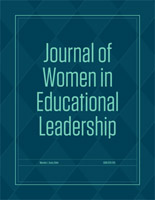Educational Administration, Department of

Journal of Women in Educational Leadership
Date of this Version
1-2008
Document Type
Article
Citation
Journal of Women in Educational Leadership, Vol. 6, No. I-January 2008 ISSN: 1541-6224
Abstract
This research explored how 15 female superintendents from a southwestern state experienced issues of gender bias. Participants came from a mix of urban, rural, and suburban districts that varied in size from 150 to 25,000 students. Using in-depth interviews and a transcendental phenomenological qualitative approach, the researchers examined how these women perceived that gender bias affected their accession to and work in the school superintendency. Three major themes emerged from their experiences: overcoming obstacles in the career path, the importance of mentoring, and surmounting gender-related stereotypes of leadership. The lack of female superintendents leading American public school districts highlights the question: What role does gender inequality play in this phenomenon? Historically, little attention has been given to the experiences and perceptions of women superintendents in the educational administration literature (Bell, 1988; Brunner, 2000; Shakeshaft, 1989; Skrla, Reyes, & Scheurich, 2000). However, an emerging body of research on women and educational administration examines the under representation of women in building and district leadership positions. A theme in this literature is associated with gender inequities or biases and stereotypes associated with women and leadership (Brunner, 2000; Young & McLeod, 2001). Attention to these issues is continually examined to gain more insight and explore factors to reduce these barriers. The purpose of this exploratory study was to discern how 15 women leaders in southwestern state school districts perceived gender bias affected their progress toward and work in the superintendency. Three key themes emerged from the data: overcoming obstacles in the career path, the importance of mentoring, and surmounting gender-related stereotypes of leadership.


Comments
Copyright © 2008 Pro>Active Publications. Used by permission.